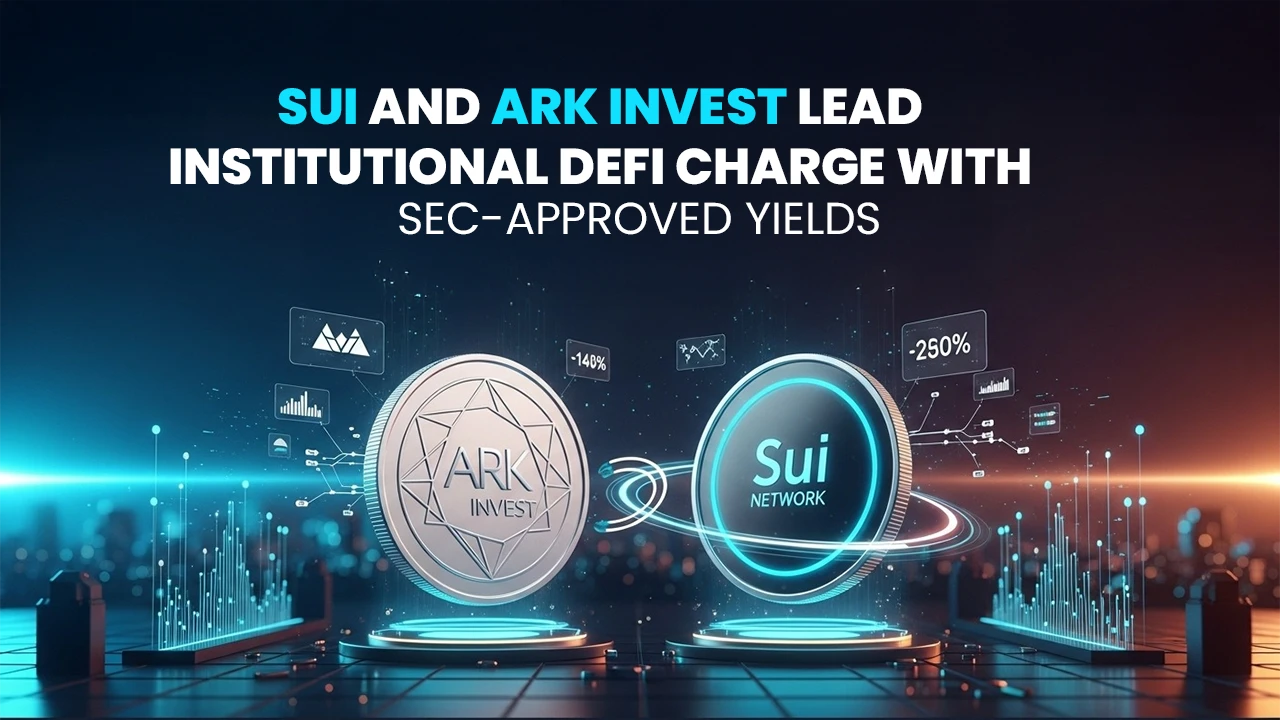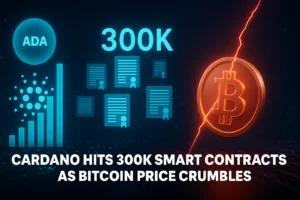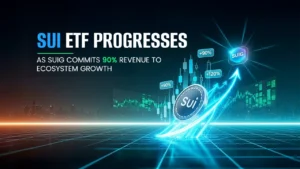ARK Invest Pushes DeFi Forward with 11.5% Solmate Stake as Sui Tokenizes SEC-Approved Yields

Digital assets are absorbing a set of decisions that point in one direction: regulated yield on high-throughput rails. ARK Invest disclosed an 11.5% stake in Solmate Infrastructure, a Nasdaq-listed operator aligned with the Solana ecosystem.
- Ark’s Stake in Solmate Anchors a Solana Thesis: “From Cap Table To Validators”
- Why the SOL Discount Matters Less Than the Use of Proceeds: “Monetize Throughput”
- Sui and Figure Join Forces: “SEC-Registered YLDS, Native to Execution”
- Bybit Adds USDC on Sui: “Zero-Fee Withdrawals to Reduce Friction”
- One Blended Narrative: “Public-Market Signal Meets On-Chain Mechanics”
- What Investors Should Watch Next: “Execution, Disclosures, Liquidity”
- Market View For Allocators: “Basis, Carry, And DPoS Accountability”
- The Moves and Why They Matter
- Conclusion:
- Frequently Asked Questions About Ark Invest, Solmate, Sui, and USDC
- How Significant Is ARK’s Position In Solmate?
- Why Does The Discounted SOL Purchase Stand Out?
- What Does YLDS Change For Sui Users And Venues?
- How Does Bybit’s USDC Integration Affect Adoption?
- Where Does Delegated Proof Of Stake Fit In This Story?
- What Should Investors Monitor Next?
- Glossary of Key Terms
On the same day, Solmate said it purchased $50 million in SOL at a 15% discount from the Solana Foundation to fund bare-metal validators in Abu Dhabi.
Additionally, Sui announced that Figure’s SEC-registered yield token, YLDS, will be issued natively to power a compliant yield layer for trading. Bybit added USDC on Sui with a zero-withdrawal-fee promo to lower the cost of moving dollars on-chain.
Together, these updates compress the distance between institutional expectations and on-chain execution. Delegated Proof of Stake (DPoS) appears throughout the narrative, linking tokenholders, professional operators, and predictable finality in a model that investors can rely on.
ALSO READ: ARK Invest Rolls Out Space-Defense ETF in Europe as XDC Network Makes Headway in Dubai
Ark’s Stake in Solmate Anchors a Solana Thesis: “From Cap Table To Validators”
ARK Invest reported an approximately 11.5% position in Solmate Infrastructure via a Schedule 13G dated September 30, 2025. The disclosure matters because it places a regulated asset manager on the cap table of a listed, Solana-aligned operator building validators rather than simply holding tokens. The stake sits next to Solmate’s discounted SOL purchase from the Solana Foundation and frames a public-markets thesis that investors can track with familiar metrics.
Solmate’s filed details add texture. The company bought $50 million in SOL at a 15% discount during a volatile window, with the Solana Foundation securing the right to nominate up to two board directors. The tokens will power bare-metal validators in the UAE within the Foundation’s “Solana By Design” program.
The intent is to convert token inventory into validator revenues, not leave it idle on the balance sheet. That shift, from price exposure to productive infrastructure, is measurable in uptime, effective stake, and realized rewards.
DPoS underpins this plan. Delegation concentrates block production in accountable operators while letting broad holders participate in rewards. For allocators, that structure offers operator selection, visible performance, and a path to yield that aligns with governance signals.
Why the SOL Discount Matters Less Than the Use of Proceeds: “Monetize Throughput”
Discounted placements are common. What sets this one apart is the stated deployment into validators and a governance link to the Foundation. If Solmate scales reliable validators, the firm’s treasury can evolve from pure beta to yield-plus-beta, with rewards driven by stake, performance, and any allowed MEV-adjacent economics.
ALSO READ: Is Cardano Back on Track: How Hydra and Exchange Staking Revived a 10% ADA Rally
Board-nomination rights create tighter alignment between the Foundation’s network targets and the operator’s accountability. The investment case becomes operational rather than headline-driven. The practical takeaway for investors is simple: follow the conversion rate of tokens into stable validator income and watch disclosures on operations, slashing events, and realized APR.
Sui and Figure Join Forces: “SEC-Registered YLDS, Native to Execution”
On October 14, Sui and Figure announced that YLDS, an SEC-registered yield-bearing security token, will be issued natively on Sui. YLDS targets SOFR minus 35 basis points, with daily accrual and monthly payments, backed by short-duration instruments such as Treasurys and repo.
You can now withdraw USDC on @Bybit_Official with zero fees ⚡️ https://t.co/vob6TbzPaA
— Sui (@SuiNetwork) October 14, 2025
Native issuance places a regulated yield instrument next to Sui’s matching engine, DeepBook, including its planned margin system. The design aims to let balances accrue regulated yield while remaining instantly usable for trading.
For US investors, the compliance posture is as material as the rate. A tokenized, registered instrument with a clear benchmark and periodic payment slots into risk frameworks that remain cautious about unregistered yield mechanics. Sui’s execution model and validator set give the accounting the low-latency environment it needs.
Here again, Delegated Proof of Stake is relevant. A DPoS-style operator map allows institutions to evaluate who runs the boxes, how often they fail, and how disputes are resolved, using controls that are legible to traditional risk teams.
Bybit Adds USDC on Sui: “Zero-Fee Withdrawals to Reduce Friction”
Bybit launched USDC on Sui and introduced a zero-withdrawal-fee promotion. For active users, fee schedules shape routing choices. For new users, zero fees can be the nudge to test a new chain. For protocols, fee relief can seed liquidity while a regulated yield product like YLDS clears the compliance bar. Bybit’s incentive sits at the on-ramp, which aligns with Sui’s plan to make compliant yield feel native rather than bolted on.
YLDS, Figure’s SEC-registered, yield-bearing stablecoin, will be issued natively on Sui.
This partnership brings:
• USD on/off-ramps through YLDS
• SUI as a potential collateral on @Figure
• Compliant, scalable DeFi infrastructureLearn more 👇https://t.co/r3FNaL2Dyg pic.twitter.com/7yULoevRNt
— Sui (@SuiNetwork) October 14, 2025
One Blended Narrative: “Public-Market Signal Meets On-Chain Mechanics”
The pieces connect. ARK’s disclosed position in Solmate shows public-market capital funding a real operator in a Delegated Proof of Stake environment. Solmate’s discounted SOL buy is a bet on earning validator income under Foundation oversight.
ALSO READ: Cardano Releases Hydra Node 1.0; Aims for Faster Transactions, Higher Throughput
Sui’s YLDS deployment ensures a regulated yield instrument sits next to the order book rather than in a silo. Bybit’s USDC support with zero withdrawal fees trims frictions for dollars moving into that stack. Together, these moves nudge the market toward a model where compliant yield, accountable operators, and high-throughput settlement converge.
What Investors Should Watch Next: “Execution, Disclosures, Liquidity”
- Track Solmate’s validator rollout and disclosures, uptime, effective stake, realized rewards, and any board changes linked to the Foundation’s nomination rights.
- Examine how YLDS integrates with DeepBook, including whether stable balances are automatically swept into YLDS for margin and lending use-cases.
- Watch USDC flows to Sui and the duration of Bybit’s zero-withdrawal-fee window. These are execution-level signals that test whether the thesis holds beyond announcements.
Market View For Allocators: “Basis, Carry, And DPoS Accountability”
Risk desks will map YLDS’s SOFR-linked accrual to basis and carry frameworks for on-chain strategies. If DeepBook integrates YLDS as planned, margin programs could harvest a predictable reference rate while preserving trading flexibility. On Solana, Solmate’s validator economics will be judged on realized rewards and operator reliability, not only token price.
Delegated Proof of Stake deserves emphasis once more. It reduces operational burden for passive holders while keeping performance in view for allocators who can select reputable operators. That mix can unlock more conservative capital if disclosures remain consistent.
ALSO READ: TRON Reboots WBTC as This Gaming Giant Picks Sui to Launch New Survival MMO
The Moves and Why They Matter
| Development | Core Fact | Why It Matters |
| ARK Invest Stake In Solmate | ~11.5% ownership via Schedule 13G | Public markets indicate a need for a listed Solana-aligned operator focused on validators, not just token exposure. |
| Solmate’s Discounted SOL Purchase | $50M SOL at a 15% discount with Foundation board-nomination rights | Proceeds fund bare-metal validators in Abu Dhabi, tying treasury to productive on-chain yield with governance alignment. |
| YLDS Issued Natively On Sui | SEC-registered token, SOFR minus 35 bps, daily accrual | Regulated yield moves into the execution layer, creating a compliant base rate for on-chain trading through DeepBook. |
| USDC On Sui At Bybit | USDC support with a zero-withdrawal-fee promo | Lowers the cost to move dollars onto Sui, priming liquidity for YLDS-enabled activity and broader DeFi usage. |
Conclusion:
ARK Invest put public-market weight behind Solmate, which is using discounted SOL to build validators under the Solana Foundation programs. Sui and Figure are placing SEC-registered, SOFR-linked yield at the core of an execution-first trading stack.
Bybit’s USDC integration with zero-withdrawal fees trims the final mile for moving dollars to the venue. Delegated Proof of Stake runs through the middle, making operator performance, governance, and rewards visible to allocators who demand accountability. If these plans hold through consistent disclosures and uptime, institutional crypto edges closer to compliant yield at speed.
Frequently Asked Questions About Ark Invest, Solmate, Sui, and USDC
How Significant Is ARK’s Position In Solmate?
ARK disclosed about 11.5% ownership of Solmate Infrastructure as of September 30, 2025. It signals a public-markets bet on a Solana-aligned operator focused on validator economics and governance alignment.
Why Does The Discounted SOL Purchase Stand Out?
The 15% discount is less important than the use of proceeds. Solmate plans to fund bare-metal validators under Solana Foundation oversight, turning inventory into on-chain yield with transparent performance metrics.
What Does YLDS Change For Sui Users And Venues?
YLDS is an SEC-registered, SOFR-linked token issued natively on Sui. It is designed to slot into DeepBook’s margin stack so balances can accrue regulated yield while remaining ready for trading.
How Does Bybit’s USDC Integration Affect Adoption?
Zero-withdrawal fees reduce friction for moving dollars to Sui. That can accelerate early liquidity for YLDS-connected flows and broader DeFi usage on the network.
Where Does Delegated Proof Of Stake Fit In This Story?
DPoS allows tokenholders to delegate to professional operators, improving accountability and performance without forcing every holder to run infrastructure. That structure aligns with due diligence practices and supports predictable finality.
What Should Investors Monitor Next?
Validator uptime and reward disclosures at Solmate, the operational rollout of YLDS inside DeepBook, and the persistence of Bybit’s zero-withdrawal-fee window for USDC on Sui.
Glossary of Key Terms
- Delegated Proof Of Stake (DPoS): A consensus approach where tokenholders delegate validation to selected operators who earn rewards and are accountable for performance.
- DeepBook: Sui’s native central limit order book and liquidity layer for spot and planned margin.
- SOFR: The Secured Overnight Financing Rate, a US dollar funding benchmark used for floating-rate products.
- Schedule 13G: A US filing required when investors pass the 5% ownership threshold with passive intent.
- Validator: An operator that proposes and verifies blocks on a proof-of-stake network.
- On-Chain Yield: Return generated natively from network mechanics, such as staking or protocol revenue.
- Registered Security Token: A digital asset registered with the SEC that carries defined disclosure and compliance obligations.
- Repo (Repurchase Agreement): Short-term borrowing collateralized by Treasurys, used for liquidity management.
- Bare-Metal Validators: Validators running on dedicated hardware for performance and reliability.
- On-Ramp: A mechanism for moving dollars into crypto assets or onto a chain.




